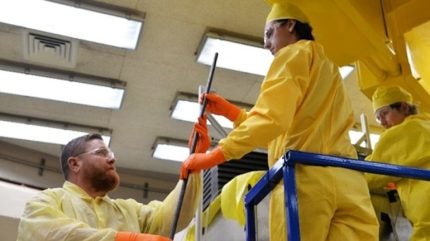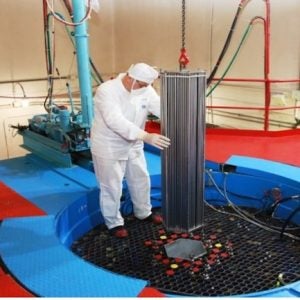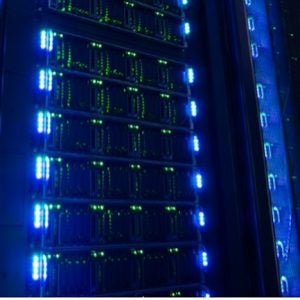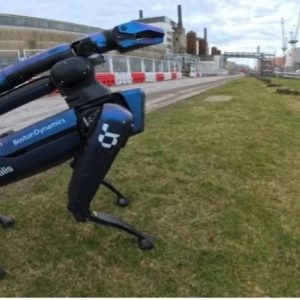
For the first time in more than two decades, researchers at the US Los Alamos National Laboratory (LANL) have performed critical experiment using high-assay low-enriched uranium (HALEU) TRISO (TRI-structural ISOtropic) fuel. The Deimos experiment was performed at the National Criticality Experiments Research Centre (NCERC) outside of Las Vegas, operated by LANL at the Nevada National Security Site.
The experiment ties into a larger effort between the US Department of Energy (DOE) and Nuclear Regulatory Commission (NRC) to provide new design and safety related data on the use, storage, and transportation of HALEU. Currently there are few benchmarks for HALEU, which is enriched to between 5% and 20% uranium-235. The Deimos project aims to support licensing of HALEU that many advanced reactor designs require. “The Deimos experiment is an important step toward deploying HALEU-fuelled nuclear reactors,” said LANL programme manager for nuclear energy, Chris Stanek.
LANL researchers describe Deimos as a HALEU-fuelled and graphite-moderated advanced reactor test bed. At NCERC, researchers adapted a critical assembly machine to accommodate a new graphite core with “cups” to hold HALEU-based fuel pellets containing TRISO particles. After demonstrating criticality, the experiment was measured at room temperature and heated to more than 200°F to generate new criticality safety data.
The Deimos demonstration was funded by LANL’s Laboratory Directed Research & Development programme and supports other criticality benchmarking work underway through DOE’s HALEU Availability Program. The 2022 US Inflation Reduction Act provided $700m to the HALEU Availability Program, including up to $60m for HALEU criticality benchmarking.
After issuing the first of three planned calls for proposals, DOE in August awarded $17m to 16 laboratory-led projects through the DOE/NRC Collaboration for Criticality Safety Support for Commercial-Scale HALEU for Fuel Cycles & Transportation (DNCSH) to help develop public data and criticality benchmarks. Project teams include six national laboratories taking lead roles in partnership with other labs, universities, and multiple industry partners.
The DNSCH project is undertaken in collaboration with the National Nuclear Safety Administration’s (NNSA’s) Nuclear Criticality Safety Program and the DOE Office of Science’s Nuclear Physics National Nuclear Data Program. A second proposal call for experiment and analysis work packages is expected in early 2025.
Meanwhile, DOE has announced that up to $16m is available through a new HALEU Transportation Package Funding Opportunity to research, develop, and acquire NRC licensing for HALEU transportation packages. DOE aims to develop long-term economical solutions for the transportation of HALEU through the development of new transportation packages or the modification of existing packages.
“Transportation is the key link connecting all parts of our domestic HALEU supply chain,” said Acting Assistant Secretary for Nuclear Energy Dr Mike Goff. “DOE is actively assessing industry needs and is committed to developing highly efficient and cost effective methods for HALEU transportation.”
There are only limited licensed options for transporting HALEU, including the use of highly enriched uranium casks, which can be costly and time consuming. To support additional advances in package concepts based on existing package designs or in development and support of fundamentally new package designs. Developing new HALEU-specific containers will probably take significant time and investment, while modifying existing designs could provide a more near-term solution.
Improving HALEU transportation ties into the work already underway through the HALEU Availability Program to ensure access to HALEU for civilian domestic research, development, demonstration, and commercial use.
DOE has identified two topics areas for application.
- Applications for NRC certification of new package design concepts. DOE intends this topic for concepts that will likely require sufficient award duration and funding to achieve cost competitive, economically viable transportation packages. Awards will have a performance period of up to three years.
- Applications for NRC certification of modification to existing design packages. DOE intends this topic for concepts that are further along in the development and require less time and costs associated with achieving NRC certificate of compliance (CoC). Awards have a performance period of up to two years.
The Energy Act of 2020 authorises DOE to establish and carry out a programme to support the availability of HALEU for civilian domestic research, development, demonstration, and commercial use. DOE established the HALEU Availability Program to respond to this congressional direction.






